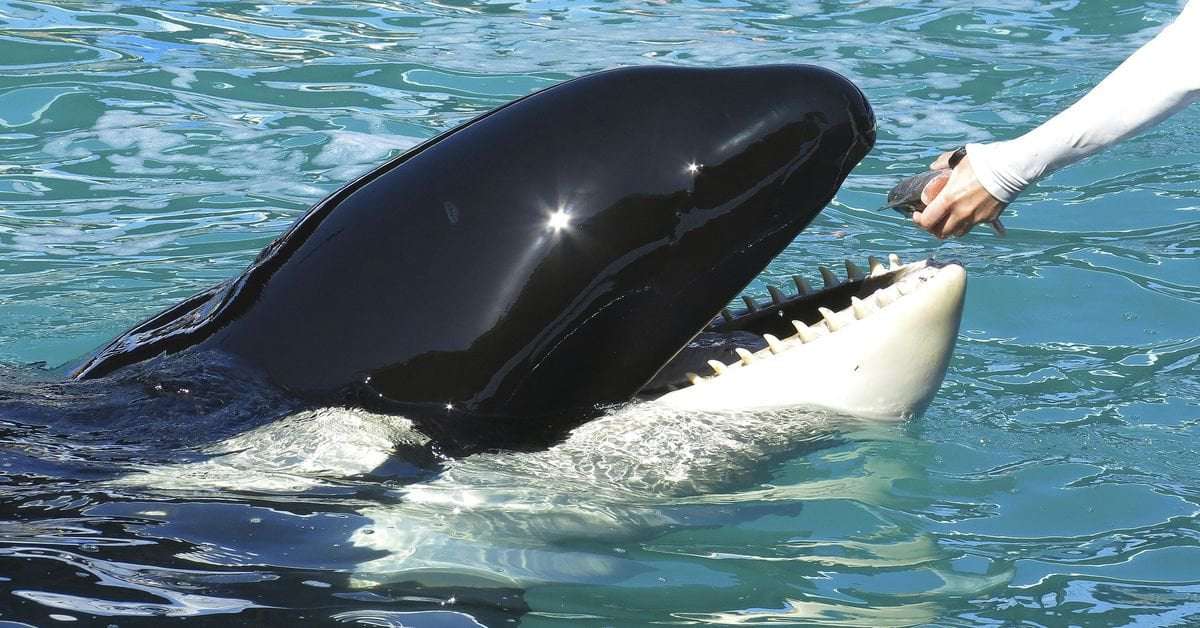March 30 (Reuters) - A Florida aquarium has reached a deal with animal welfare advocates to release Lolita, a 5,000-pound (2,268 kg) killer whale held in captivity for more than half a century, officials said on Thursday.
The Miami Seaquarium said it had reached a "binding agreement" with nonprofit Friends of Lolita to return the whale, who recently retired from performances, to an ocean habitat in the Pacific Northwest within two years.
Lolita, a 57-year-old orca captured in 1970 in a cove off Seattle, is also known as Toki, a name that is short for the whale's Native American name of Tokitae, the Miami Herald reported. The plan to return Lolita to her natural habitat requires federal approval, according to the newspaper.
The process to return Lolita to her "home waters" was years in the making, beginning with the transfer of the aquarium's ownership to The Dolphin Co, Miami-Dade County Mayor Daniella Levine Cava said at a news conference. The company later partnered with the nonprofit to provide medical care to the whale.
The Seaquarium's previous owner, SeaWorld Entertainment Inc (SEAS.N), phased out killer whale shows in 2016. Lolita, once a top attraction at Seaquarium, was retired from shows in March 2022 after management changed hands.
"Finding a better future for Lolita is one of the reasons that motivated us to acquire the Miami Seaquarium," The Dolphin Co Chief Executive Eduardo Albor said in a statement.
The push to free Lolita gained momentum after the 2013 documentary "Blackfish" highlighted the captivity of orcas.
Animal rights advocates for years fought unsuccessfully in court to obtain Lolita's freedom after the National Oceanic and Atmospheric Administration added orcas to the endangered species list in 2015.
Killer whales are highly social mammals that have no natural predators and can up to 80 years.
Reporting by Tyler Clifford in New York; Editing by Bill Berkrot
Our Standards: The Thomson Reuters Trust Principles.

Relevant_Quantity_49 on March 31st, 2023 at 01:20 UTC »
For anyone who remembers the failure of Keiko's release, his circumstances were somewhat different from Lolita's. Here's a copy of a post I made a couple of weeks ago on them.
Orcas are socially complex animals, with each pod often having distinct behaviors and vocalizations. To use an anthropomorphic term, orca pods can be said to have distinct cultures. You can't introduce an animal from one pod into another and be assured it will seamlessly integrate; you have to find the animal's original pod.
The rehabilitators never found Keiko's original pod. Instead he was released near a random pod of wild orcas with hopes he would somehow integrate. It was the orca-equivalent of taking some WASP from the American suburbs, dropping them into rural Afghanistan, and hoping it would work out.
It didn't work, so Keiko remained solitary with respect to other orcas. It's no wonder he sought out human companionship; orcas are social animals, and he had years of positive reinforcement around people. Worse, John Q. Public sought him out, further strengthening that relationship.
If we wanted to try again, the best candidate (assuming she's healthy enough) would be Miami Seaquarium's Lolita. We know exactly which pod she came from and where they are--they're one of the best studied pods in the world--and when a vocalization study was conducted, IIRC, in the 90s, she still recognized their calls. Quite frankly, Miami Seaquarium could contribute more to orca behavioral research by supporting such a project than they ever have because it would give us a chance to see whether or not an animal separated from its pod for decades could successfully reintegrate. Would they accept her? Would they take care of her? Would they teach her to be a wild orca again? Answers to such questions would tell us a lot about their capabilities as animals.
(Source for information on Keiko: As an undergrad studying Animal Behavior, I attended a seminar on the effort and failure behind Keiko's rehabilitation, held by people involved in it.)
Dangerous_Wave on March 30th, 2023 at 22:28 UTC »
To all the naysayers :
Tokitae's - stage name Lolita's - mother is still alive, and as of an experiment conducted in 2020, they both recognize each other's calls.
This was *not the case with the unfortunate Willy, who was basically speaking Spanish in Russia when it came to the pods near where he was released.
Tokitae has a far better chance at readapting because of her mother and living siblings.
notunek on March 30th, 2023 at 22:00 UTC »
They have to train Lolita to find her own food and hunt for 18 months before they take her home to the Pacific Northwest. I hope she survives in the wild after most of her life in a small tank.